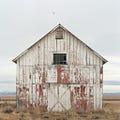Milly practiced at the far end of the range, away from the men.
A drone approached. Father spoke from its voice box. “Come back to the Homestead.”
Shouldering her rifle, Milly hopped on her fat-tire bicycle. Her half-brother and his red-headed friend sat idle, watching her go.
Father took the rifle from Milly and presented a metal cage containing several cowering feral cats. “Take them to the old family barn. Rats ate the grain. Find a hole in the siding and let them through.”
Milly tied the cage of yowling felines onto her bicycle’s rack, then pedaled several kilometers to the barn. A rusty padlock hung on the huge barn door. She released the cats as instructed. The enraged animals scratched her hands.
The rats inside scampered in all directions.
It became Milly’s job to deliver water each week to help the cats survive. More than a year later, Father summoned Milly before dawn. She watched from the corner of the chapel as he greeted selected members of his flock. Father whispered in their ears. Hearing his words, some smiled. Others wept.
Some claimed to see Father’s glow. That’s doubtful.
Milly squinted, then rolled her eyes.
Once the followers left, Father approached. “There were too many rats. Now there’s too many cats.” He presented Milly with the rifle and two boxes of bullets. “Go to the barn. Kill every last one.”
Her eyes widened.
“Skip school. Cover up; always protect your skin.” Father dangled a key in front of her.
Milly took it, then pedaled her bike down the path. Opening the padlock, she swung open the barn door for the first time. She paused, entered, then took her first shot. Some cats were hapless, some hid, others ran — some were just kittens. While reloading outside, she looked up. A drone flying overhead whizzed off.
It took hours but Milly killed them all — except one.
One small, brown tabby cat, with a distinctive white stripe across its nose, returned from its hunt, a rodent dangling from its mouth. The wily cat hid in the brush, away from the massacre.
Old tools littered the barn. Milly found a shovel, dug a pit outside, and buried the corpses. She took shelter inside from the afternoon heat. Rat feces abounded. Blood splattered the walls, the floor, and Milly.
It must have smelled godawful.
The barn had a loft, but the stairs up were missing. Milly opened a dusty old plastic tub resting on the ground, mercifully sealed from the filth. “Treasure.” She took off her bloody gloves.
Inside were crime books: Nancy Drew, Jim Thompson’s A Hell of a Woman, and true crime from around the Millennium.
Self-help books: depression, nonverbal communication, and addiction recovery.
Comic strip paperbacks: The Other Side and Garfield the Cat.
Vinyl records: Cyndi Lauper, Pat Benatar, Pet Shop Boys, Missy Elliott, and the artist Milly would develop a difficult relationship with — Belinda Carlisle. Milly flipped to a Bangles album. She puffed out her lips, matching their look.
The last in the stack read:
— Mistaken Identity
Pressing open the cardboard, Milly took a deep breath, then pulled out the sleeve.
Since Milly looked up “precocious” in the dictionary the next day, she must have read the lyrics.
She let her hair loose, staring at the album cover and the singer’s picture: Kim Carnes.
They look alike. They could be mother and daughter — but they’re not.
Milly unwrapped a bundled washcloth, revealing an empty bottle of perfume.
— Mademoiselle
Uncorking it at her nose, her eyes crossed as she smiled.
Even the dried-out residue probably smelled wonderful, like nothing ever before.
The last treasure was a seashell. Fondling it, Milly said, “I want to swim.”
She must have seen the last cat enter the barn; she reached for her rifle.
The creature must have seen her, too. It scurried off.
An electric motorbike with knobby tires leaned in a corner. Examining its battery at two-thirds charge, Milly managed to start it. Smiling, she motored around. Milly may have pondered taking the motorbike back to the Homestead, but instead, she unplugged its battery and rolled it behind some crates. After locking the barn door, she wrapped the battery with her hat and secured it onto the rack on her bicycle, then pedaled home.
Father awaited.
She presented her rifle, as was tradition.
“Keep it,” he said. “The weapon’s yours now.”
“But we aren’t allowed possessions — you said so.”
He glared.
Milly dipped her head. “Thank you, Father.”
“Not a gift. You earned it.” He glanced at her bicycle and eked out a little smile. “You left the motorbike in the barn. Smart.”
Father turned his back. “You have new quarters.” He made a fist. “On my right-hand side. Down the hall, at the edge of the women’s. Plug your battery in there.” Walking off, he said, “Happy birthday.”
Because of the prior year, Milly may have forgotten what day it even was. She’s never said.
That night, in her tiny new quarters, in her narrow bed, she snuggled her back against the wall. As she watched her battery’s red bars light up with charge, Milly’s face was devoid of any sort of expression.
But she must have felt something because our connection remained.
Milly was then fourteen.




